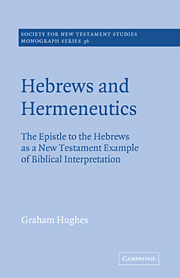 Hebrews and Hermeneutics
Hebrews and Hermeneutics The Son as the new form of God's ‘Address’
There are few more striking or more carefully written sentences in the New Testament than that with which the Epistle to the Hebrews begins. These succinct, economical words describing God's self-disclosure through many generations but as having now taken place finally and fully in the person of his Son, are regularly referred to as a model statement of this Christian conception of revelation. And yet it is precisely the care with which the sentence has been put together which raises certain difficulties about it. For such a carefully written statement asks that care is taken that it be understood. But herein is our problem. For not only does the all-but-explicit ‘Logos-doctrine’ appear quite unrelated, either literally or theologically, to the highpriestly Christology – or for that matter to any of the other major Christological expressions of the letter – but where the term ‘Word of God’ does appear it bears no obviously Christological significance.
We might be excused, therefore, in regarding it as a polished but essentially unrelated headpiece to the body of the work. But in this case the question may be asked whether we have fulfilled our responsibility to understand the statement or whether we have not simply abdicated from it.
Our investigation, as has been hinted, must run at two levels. We must attempt in the first place to understand the literary connections which run between the prologue and the body of the letter.
To save this book to your Kindle, first ensure [email protected] is added to your Approved Personal Document E-mail List under your Personal Document Settings on the Manage Your Content and Devices page of your Amazon account. Then enter the ‘name’ part of your Kindle email address below. Find out more about saving to your Kindle.
Note you can select to save to either the @free.kindle.com or @kindle.com variations. ‘@free.kindle.com’ emails are free but can only be saved to your device when it is connected to wi-fi. ‘@kindle.com’ emails can be delivered even when you are not connected to wi-fi, but note that service fees apply.
Find out more about the Kindle Personal Document Service.
To save content items to your account, please confirm that you agree to abide by our usage policies. If this is the first time you use this feature, you will be asked to authorise Cambridge Core to connect with your account. Find out more about saving content to Dropbox.
To save content items to your account, please confirm that you agree to abide by our usage policies. If this is the first time you use this feature, you will be asked to authorise Cambridge Core to connect with your account. Find out more about saving content to Google Drive.